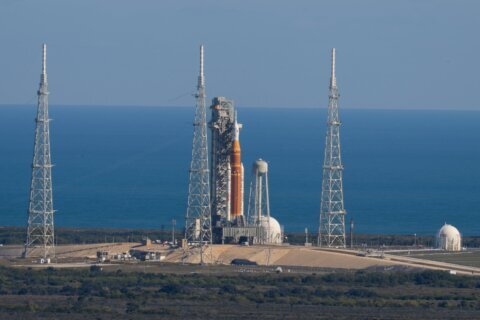Monday’s solar eclipse could cause thousands of people to lose vision if they don’t take the proper precautions, one expert warns.
The solar eclipse: Everything you need to know
Unless you’re living under a very large and heavy rock, you probably know that a solar eclipse is coming Monday. It’s the first coast-to-coast solar eclipse in close to a century. But you probably don’t know all the damage it could do to your eyes if you look directly at it without proper eyewear.
University of Washington’s Dr. Russell N. Van Gelder, who is planning to be in Casper, Wyoming, Monday to see the solar eclipse in its totality, likens staring directly at the sun to burning leaves outside with a magnifying glass — but worse. The focusing power of the eye is about four times that of a magnifying glass, which takes only seconds to burn a leaf or a piece of paper.
The sun’s rays are strong enough to kill cells right in the middle of your vision, leading to what’s called solar retinopathy. Put simply: Staring at the sun without eye protection is like burning the back of your retina, the back layer of your eyeball. And you wouldn’t even know you’re doing it because the retina has no pain fibers.
People who stare at the sun without protection would get a blind spot in their vision right away though they wouldn’t know until hours later or the next day that the blind spot was still there.
And it doesn’t matter how much of the sun you’re looking at either. Even a little crescent of sun during a partial eclipse is just as bright as a full sun in that area of your retina, says Van Gelder, clinical spokesperson for the American Academy of Ophthalmology. The only exception to this rule is if you’re in the totality of the eclipse, which will be a 70-mile span of the moon’s shadow as it progresses across the country between central Oregon and South Carolina.
Van Gelder recounted a similar eclipse in England in 1999, covering an area of around 500,000 people, resulting in 20 people developing solar retinopathy. If you take that data and apply it to now — where 10 million people will be in the path of totality and more than 100 million will see a partial eclipse — it’s possible thousands of people could lose vision.
So yes, If you stare at the sun long enough, you could become legally blind.
The American Astronomical Society has a list of reliable vendors of solar filters and viewers for eclipse viewing, though notes that it’s already too late to purchase viewers in time for Monday. That said, it recommends other safe eclipse viewing options for partial eclipse phases, like pinhole projection.
But will people actually heed all the warnings?
“I sincerely hope that all of the buzz on social media and with all the avenues for information people have now that the word will get out,” Van Gelder says. He also recommends parents and caregivers be diligent about their children’s eye protection.
And of course, head to a medical professional if you think you’ve sustained any eye damage.
“Again it depends on the degree of exposure: Patients could very rapidly experience blurred vision and if they notice there is blurred vision we suggest they seek medical attention,” says Dr. Christopher Quinn, the president of the American Optometric Association.
Megan Trimble contributed reporting.
11 Items That Help Protect Your Health
7 Ways Technology Can Torpedo Your Health
More from U.S. News
11 Items That Help Protect Your Health
10 Seemingly Innocent Symptoms You Shouldn’t Ignore
7 Ways Technology Can Torpedo Your Health
Expert: Thousands of People Could Lose Vision Because of the Eclipse originally appeared on usnews.com







